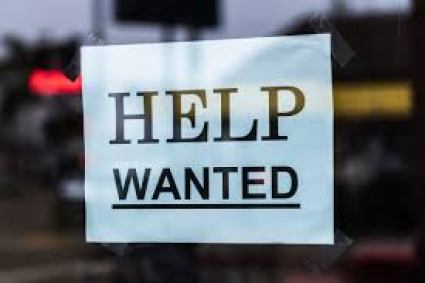Have you noticed all the “Help Wanted” signs? Businesses limiting their hours or offerings, or closing altogether, because they are short-staffed? Service workers who are more stressed out than usual? I recently got an oil change at a place with consistently excellent customer service, and something was different. The employees were as competent as usual, but there was tension in the air. At one point, I was startled by a loud clang; an employee had tossed a spent container against the wall. “No lunch break, no days off,” I heard him venting to his coworkers. “I’m going to put in my notice unless they hire more people.”
As others have reported, there is a widespread workforce shortage, especially in child care and elder care, food service and tourism, and retail industries, including many of the roles that were described early in the pandemic as “essential workers.” Maine has even resorted to subsidizing employers who struggle to hire by funding a $1,500 bonus for new employees.

Photo credit MECEP.
We are led to blame the unemployment benefits that were increased during the pandemic, reasoning that people are declining to work because they can get by, or even get more money, on unemployment. But the problem can be framed differently: not a matter of overly generous unemployment benefits (at $300 per week, they are only enough to scrape by) so much as underpayment of workers who perform stressful jobs our economy depends on, often putting their own safety at risk for little benefit.
Moreover, framing unemployment as a choice of the recipient overlooks the many caregivers, disproportionately women and workers of color, who have little choice but to stay home with their children, or other family members in need of care, because schools, day care centers, and home health services have been unavailable or unaffordable.
Even before the pandemic, there were indicators of this workforce shortage. I used to enjoy eating breakfast at the popular Scratch Toast Bar in South Portland. With a large backyard patio and open-air interior, they could have thrived during the pandemic. Yet they closed in 2019, not for lack of demand for their coffee and sandwiches, but because they could not hire and retain staff — at the poverty wages that food industry workers so often earn in our society. Restaurants and hotels across the state similarly struggled to meet demand for their services pre-pandemic, as unaffordable child care kept many a parent at home, the high cost of coastal housing kept would-be workers away, and Maine’s aging population and national visa restrictions shrunk the pool of workers easiest for employers to underpay — youth and immigrants.
More dire is the staffing crisis in care work, including child care and care for those who are aging or disabled either at home or in facilities. These workers save lives and put their own physical and emotional health at risk, yet earn less than they could at McDonald’s or an Amazon warehouse. This shortage also predated, but was intensified by, the pandemic.
Raising wages may seem the obvious solution, and many have organized to demand exactly that. The Fight for Fifteen campaign has had several successes, including the Biden administration establishing a $15 minimum wage for federal contractors. Maine state employees recently rallied to demand the same. Thanks to worker organizing, Maine has raised wages for direct care workers to 125% of the state minimum wage, amounting to $15.19 per hour. In 2020 Portlanders approved a referendum establishing a $15 minimum wage with additional hazard pay for essential workers during public health emergencies, and a handful of Portland-area restaurants are joining a national push to end subminimum wages for tipped service staff.
Yet common-sense as they seem, these demands to end poverty wages for essential workers are met with outright opposition or heel-dragging. Why? The common retort is that raising wages harms workers and small businesses (especially the near-mythical “ma and pap” stores) because businesses cannot afford to hire as many people if they have to pay workers more. From the mouths of lobbyists representing big businesses like Walmart that rake in profits while forcing the rest of us to subsidize their poverty wages through social programs, the argument is clearly made in bad faith to protect their profits and discipline workers attempting to demand humane treatment.
But what about small businesses in highly competitive, low profit-margin sectors, like the restaurant and tourism industries that Maine’s economy especially depends on? Don’t they have good reason to oppose a living wage, because many of them actually would be forced to close if they could not underpay their workers? Or forced, at best, to pass on the extra costs to customers? In either case, wouldn’t small businesses be put at a disadvantage compared to bigger, more profitable businesses, allowing big businesses to further monopolize the market?

Image credit WMCA.org
Some studies suggest that a $15 minimum wage would not result in a net decrease of jobs in the economy, but is $15 an hour even a living wage? For many Mainers, working 40 hours a week at this rate is still not enough to meet basic living expenses without relying on social assistance, especially those who have children and/or aging parents to care for. A true living wage would have to meet the rising costs of housing, health care, child care, education, transportation, which have rapidly outpaced the $15 per hour benchmark since it became a rallying point several years ago. So these hard-fought battles for raising the minimum wage, important as they are for building labor organizing and winning concessions, are a necessary but insufficient response to the workforce shortage created by poverty wages.
The solution must be deeper than raising wages — because the problem is deeper. The problem is not simply the greed of individual business owners, but the nature of capitalism itself. The only way capitalists can remain in business is to continually profit, and the only way to profit is for business owners to extract more value from workers than they pay back to workers in wages. While many big businesses that reward their executives with exorbitant incomes can afford to pay their workers better, the problem becomes clear in the case of small businesses. It is not as if small business owners can simply stop underpaying their workers and then everyone will prosper equally. Rather, owners exploit their workers because if they do not, they must go out of business and become exploited workers themselves.
So what can be done? Ultimately, we must decouple profit from livelihood. We must guarantee that people are secure in the essentials of life — child care, health care, food and water, housing, education, transportation, and so on — even though they do not work for, or own, a business that turns a profit.
We have seen a glimpse of this possibility in response to the pandemic: the boost to unemployment income and food assistance, helping low-income tenants stay in their homes, suspending some student debt payments. But these temporary, partial measures have only staved off systemic crisis, softening its edges while doing little to change the underlying dynamic in which meeting one’s basic needs requires either exploiting workers or being an exploited worker for the sake of profit.

For more info, go to: https://www.maine.gov/dhhs/ocfs/support-for-families
Reorganizing society around meeting needs rather than making profits will not happen overnight, but we can start with reforms that will provide immediate relief to both the labor shortage and deprivations of capitalism. For example, guaranteeing child care will enable many parents, disproportionately women, to enter or re-enter the workforce. Welcoming more immigrants will increase the number of young workers to care for Maine’s aging population. Expanding transportation will enable rural Mainers to commute where their labor is needed.
Of course, the jobs created to provide these essential services must pay a true living wage. But there is only so much room within the profit-driven economy for workers to receive the higher wages they rightfully demand. Only an economy based on meeting human needs can do the job that our profit-driven economy fails to do: ensure a decent standard of living for all people, including the workers who provide the essential services we all depend on.




